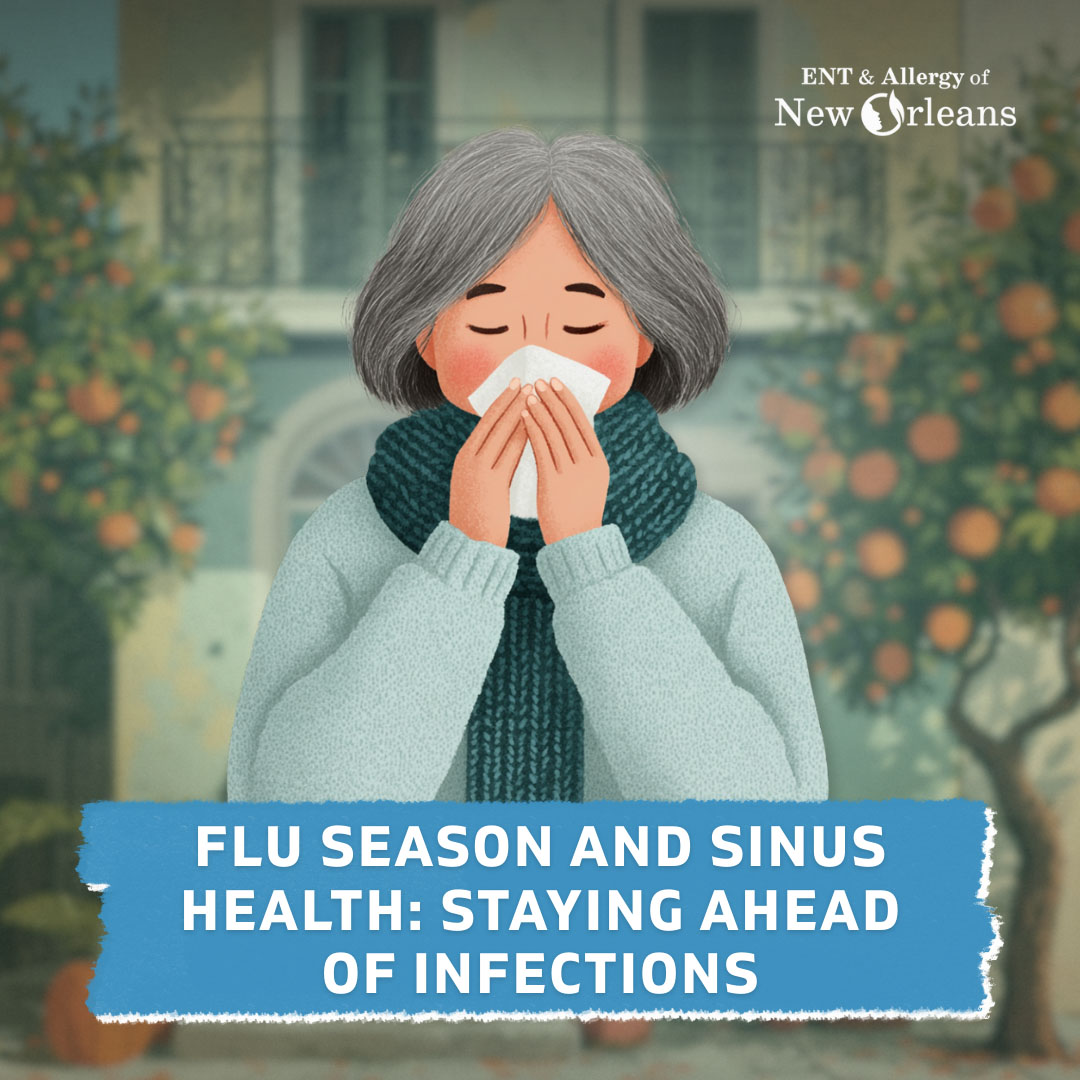Allergy News & Information Blog

🩺 Flu Season and Sinus Health: How New Orleans Patients Can Stay Ahead of Infections
If you’ve noticed more sneezing, congestion, or sniffles lately, you’re not alone. As the weather cools and humidity drops, flu season in New Orleans begins to pick up. From crowded offices to family gatherings, germs spread easily — and your sinuses often feel the impact.
For those with allergies, asthma, or sensitive sinuses, this time of year can be especially challenging. The good news? With the right preventive habits, you can protect your sinus health and reduce your risk of infection before symptoms take hold.
🤧 Can the Flu Lead to Sinus Infections?
The flu doesn’t directly cause a sinus infection, but it can easily set the stage for one. When the flu virus inflames the lining of your nasal passages and sinuses, it traps mucus inside — creating an environment where bacteria and other germs thrive.
Cooler, drier air thickens mucus and slows drainage, further increasing the risk of congestion and sinus infections. That’s why sinus flare-ups are so common during flu season in Southeast Louisiana.
💡 Tips to Protect Your Sinuses During Flu Season
A few small steps can make a big difference in keeping your sinuses healthy this winter.
✔️ Get Your Annual Flu Vaccine
The flu shot is your best defense against seasonal influenza and can help reduce the risk of severe illness. Staying vaccinated also protects family members and coworkers around you.
✔️ Practice Healthy Habits
Your immune system works best when your body is well cared for. Support it by:
- Eating balanced meals with plenty of fruits and vegetables
- Drinking enough water to stay hydrated
- Exercising regularly, even light daily movement
- Getting consistent, quality sleep each night
✔️ Wash Your Hands Often
Frequent handwashing is one of the most effective ways to stop germs from spreading. Use soap and warm water for at least 20 seconds — especially before eating or touching your face.
✔️ Keep Indoor Spaces Clean and Comfortable
Flu viruses can linger on high-touch surfaces and in stale air. Improve your environment by:
- Wiping down doorknobs, phones, and countertops daily
- Changing HVAC filters regularly
- Running a humidifier to keep indoor air from drying out
- Opening windows occasionally to let fresh air circulate
✔️ Be Mindful in Crowded Areas
Germs spread quickly in busy public spaces. During peak flu season, consider maintaining some distance, wearing a mask in tight indoor areas, or avoiding close contact if someone nearby is coughing or sneezing.
✔️ Rest When You’re Sick
If you feel unwell, stay home to rest and recover. This not only helps your body heal faster but also prevents spreading illness to others.
🩺 When to See an ENT About Sinus Symptoms
Even with good prevention, some people experience persistent sinus problems each winter. It may be time to see anENT specialist in New Orleans if you notice:
- Congestion lasting longer than 10 days
- Severe sinus pressure or facial pain
- Recurring sinus infections
- Trouble sleeping or breathing comfortably
Your ENT can evaluate your symptoms and determine whether allergies, infection, or structural issues are contributing to your sinus troubles.
🌿 Expert Sinus and Allergy Care in New Orleans
At ENT & Allergy of New Orleans, we help patients across Metairie, Kenner, and the Greater New Orleans areamanage sinus and allergy conditions year-round. Our board-certified specialists offer:
- Comprehensive sinus and allergy evaluations
- Advanced imaging and diagnostic testing
- In-office procedures when appropriate
- Personalized treatment plans designed for long-term comfort and breathing improvement
You don’t have to face another flu season with congestion and sinus pain.
📞 Schedule an appointment with ENT & Allergy of New Orleans today to prepare your sinuses — and your health — for the months ahead.
Disclaimer:
The information provided in this article is for informational and educational purposes only and does not constitute medical advice. It is not intended to diagnose, treat, cure, or prevent any disease or medical condition. Always seek the guidance of your physician or other qualified healthcare provider with any questions you may have regarding a medical condition or treatment.
Results may vary: Treatment outcomes and health experiences may differ based on individual medical history, condition severity, and response to care.
Emergency Notice: If you are experiencing a medical emergency, call 911 or seek immediate medical attention.


